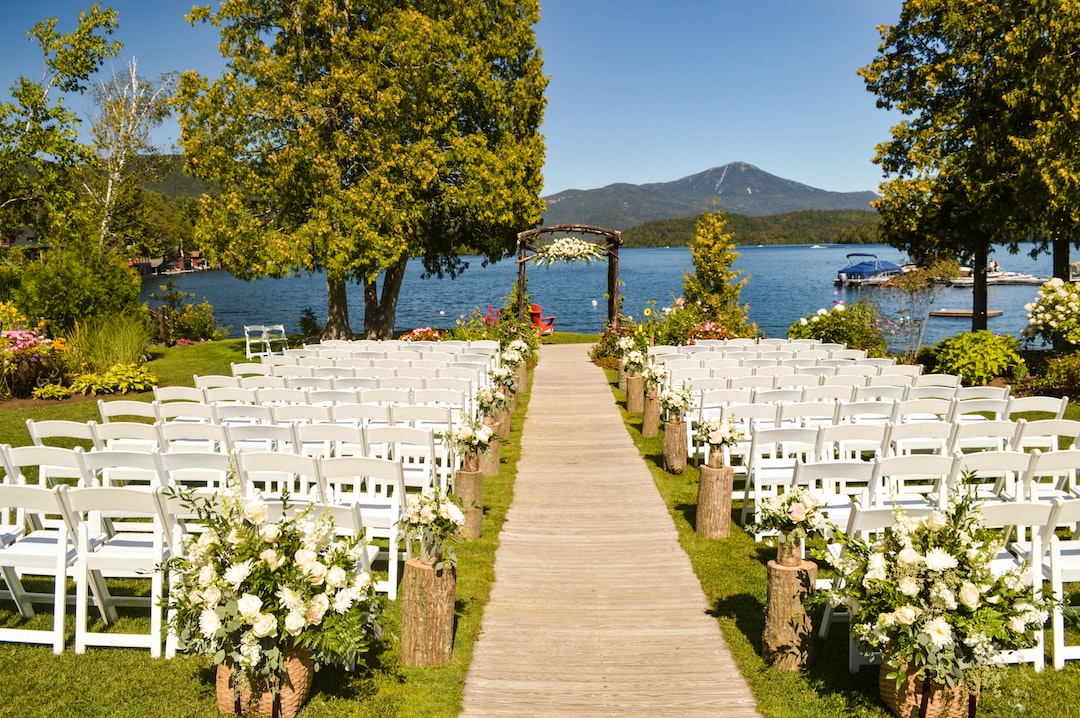Planning a wedding can be an overwhelming process, from budgeting to deciding on the perfect venue and attire.
But how long does it take to actually walk down the aisle? The length of your procession will depend on several factors such as music selection, number of bridesmaids or groomsmen, and personal preference.
To help you make these decisions easier we have compiled a list of useful info for all aspects involved in planning your special day including budgeting, venue selection, wedding attire choices, catering options, and music & entertainment selections that are sure to set just the right tone when walking down that aisle!
How Long Does It Take To Walk Down The Aisle
Budgeting
Budgeting is an important factor to consider when planning a wedding. Estimating the costs of your wedding can help you determine how much money you will need and set a realistic budget that works for you.
Estimating Costs: The first step in budgeting for your wedding is estimating the cost of everything from venue rental, catering, decorations, music and entertainment, attire, photography, and videography services. Do some research online or contact vendors directly to get quotes on what their services would cost. This will give you an idea of how much money you’ll need to allocate for each item on your list.
Setting a Budget: Once you have estimated the costs of all the items needed for your big day, it’s time to set a budget that fits within your means. Consider factors such as guest count and whether or not certain expenses are necessary before setting a final number so that there are no surprises down the line when it comes time to pay bills.
After setting a budget, look into ways to save money without sacrificing quality or style. For example, if having live music at your reception is important but hiring musicians isn’t in the cards financially right now – create playlists with songs special to both of you instead. You could also opt out of favors or skip traditional centerpieces in favor of something more affordable like candles scattered around tables that still look beautiful.
Setting a budget for your wedding is essential to ensure that you have enough funds to cover all of the costs associated with the event. Now, let’s look at how to select and book the perfect venue for your special day.
Venue Selection
Choosing the Right Location: When selecting a venue for your wedding, it is important to consider factors such as size, location, and amenities. You want to make sure that the space can accommodate all of your guests comfortably. Additionally, you should think about how far away from home or other locations people will have to travel to attend your wedding. If possible, try to find a venue that is close enough for most of your guests so they don’t have too long of a drive. Lastly, take into account any special features or amenities that you may need for your event such as audio/visual equipment or catering services.
Booking the Venue: Once you have found the perfect spot for your big day, it’s time to book it. Make sure you read through all contracts carefully before signing anything and be aware of any additional fees associated with booking the venue. Also, keep in mind any restrictions on decorations or noise levels if applicable at this particular venue so there are no surprises later on down the line.
Once the venue is selected and booked, it’s time to start thinking about what attire will be worn on the big day. From dresses and suits to accessories and shoes, there are many decisions to make when selecting wedding attire.
Wedding Attire
Shopping for Dresses and Suits: When it comes to wedding attire, the bride and groom will need to find the perfect dresses and suits. Start by looking at different styles that fit your budget. Consider materials like silk, chiffon, lace, or satin for a dress. For men’s suits, wool is always a classic choice but you can also look into linen or cotton blends as well. If you want something more unique, consider renting tuxedos or other formalwear from a local shop.
Accessories and Shoes: Once you have chosen the main pieces of clothing for your wedding day look, it’s time to accessorize. Accessories are an important part of any outfit so make sure to choose items that match both the color scheme of your wedding as well as your personal style. For women, this could include jewelry such as earrings or necklaces while men may opt for cufflinks or pocket squares. Don’t forget about shoes either – they should be comfortable enough to last all night long on the dance floor.
After selecting all of your clothes and accessories, it’s time to get them fitted properly. Alterations can help ensure that everything fits perfectly, which is especially important when wearing formalwear like tuxedos or gowns. Make sure to book fittings with tailors who specialize in bridal wear so they can help customize any necessary adjustments before the big day arrives.
Catering Options
When it comes to catering your wedding, you have two main options: hire a caterer or do some DIY food preparation. Hiring a caterer can be expensive but takes the stress out of preparing and serving food on your big day. If you choose to go the DIY route, make sure you plan ahead and have plenty of help from family and friends.
Choosing a Caterer or DIY Food Preparing: When selecting a caterer, ask for references and sample menus so that you can get an idea of their style before making any commitments. You’ll also want to discuss pricing options as well as whether they offer services such as setup, cleanup, tableware rental, etc. If you decide to prepare all the food yourself, create a timeline with tasks assigned to different people to ensure everything is ready on time.
Selecting Menus and Drinks: Once you’ve decided who will be responsible for providing the food at your wedding reception, it’s time to start thinking about what dishes will be served. Create a menu that includes something for everyone – including vegetarians or those with allergies – while still reflecting your tastes and preferences. Don’t forget about drinks either. Make sure there are enough non-alcoholic beverages available for those who don’t drink alcohol or are underage guests at your wedding reception.
It is important not only to provide tasty dishes but also ones that accommodate dietary restrictions like gluten-free diets or nut allergies among guests attending your wedding reception. Ask each guest if they have any special dietary needs beforehand so that these can be taken into account when creating menus or shopping for ingredients. Be sure all dishes are clearly labeled so everyone knows which foods contain allergens like nuts, dairy, eggs, etc., even if they are not obvious ingredients in the dish itself.
Music & Entertainment
Hiring a Band or DJ: Music is an important part of any wedding reception, and hiring a band or DJ can help ensure that your guests have a great time. When selecting the right entertainment for your special day, consider factors such as budget, musical style preferences, and the size of your venue. Make sure to book early so you don’t miss out on your favorite performers.
Creating a Playlist: A personalized playlist can be one of the most meaningful elements at your wedding reception. Choose songs that reflect both your and your partner’s personalities, as well as music from different eras that will appeal to all generations in attendance. Don’t forget to include some classic favorites like “At Last” by Etta James and “Can’t Help Falling In Love” by Elvis Presley.
If you want something extra special at your wedding reception, consider adding karaoke or dance numbers into the mix. You could even invite friends and family members up on stage for impromptu performances if they are feeling brave enough. Whatever type of performance you choose, make sure it fits with the overall vibe of your celebration so everyone has fun throughout the night.
FAQs about How Long Does it Take to Walk Down the Aisle
How long does it take for the bride to walk down?
The length of time it takes for a bride to walk down the aisle can vary depending on the size and layout of the venue, as well as any music or other elements that are included in her procession. Generally speaking, most brides take between 1-2 minutes to make their grand entrance. This includes time for guests to stand up and turn around before she reaches them, plus any pauses along the way if desired. The exact amount of time will depend on factors such as how many people are present at the ceremony and whether there is an accompanying musical accompaniment or not.
How long should a ‘walking down the aisle’ song be?
The length of a ‘walking down the aisle’ song will depend on the pace at which you want your guests to walk. Generally, it is recommended that a wedding procession song should be between 2 and 3 minutes long. This allows enough time for each bridal party member to enter and exit in an orderly fashion without rushing or dragging out the processional too much. Additionally, if there are multiple songs used during the ceremony, this can help ensure that all of them fit within a reasonable timeframe.
How long is the average wedding aisle?
The average length of a wedding aisle varies depending on the size and layout of the venue. Generally, it is recommended to have an aisle that is at least 10 feet long for every 100 guests attending. This allows enough space for couples to comfortably walk down the aisle without feeling crowded or rushed. If your venue has a longer aisle, you may want to consider having additional decorations or flowers along the sides to make it look more inviting and beautiful.




